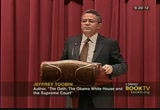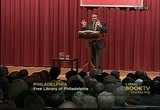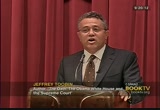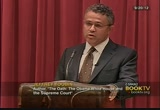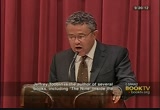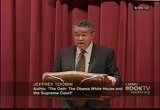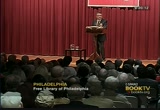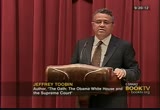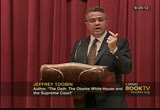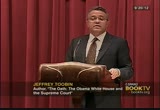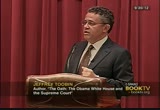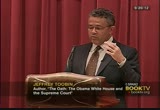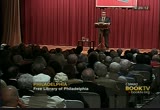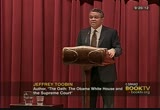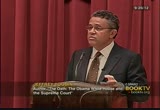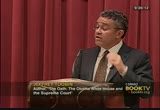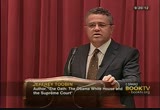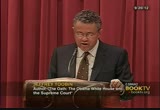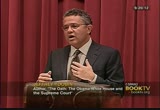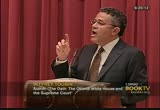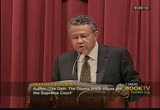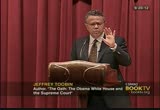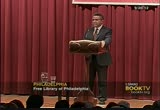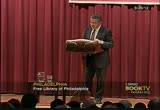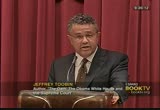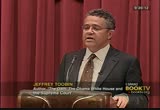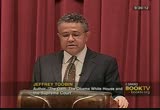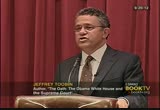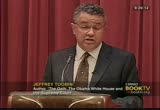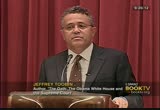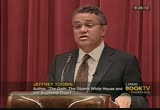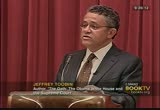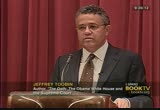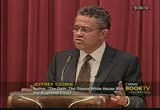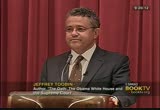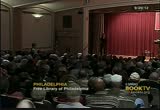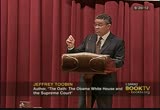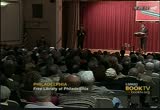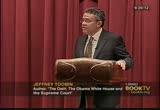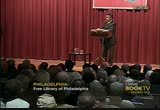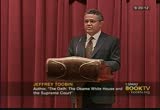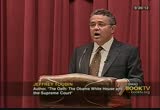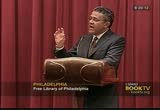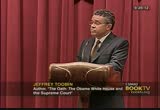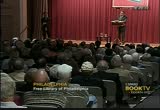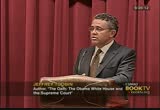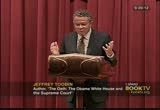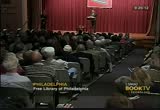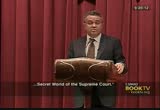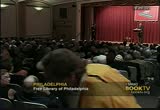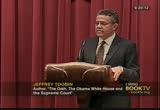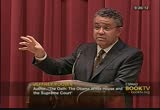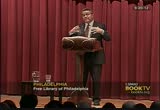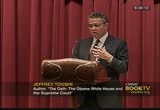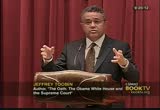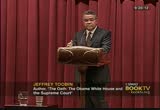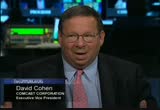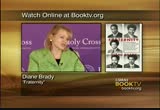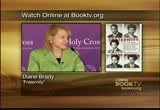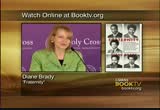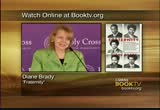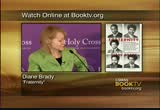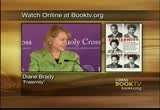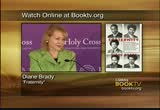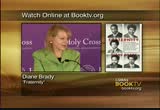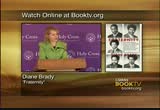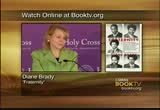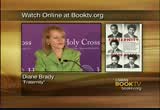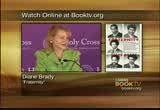tv Book TV CSPAN September 30, 2012 7:45pm-9:00pm EDT
7:45 pm
>> theoretically you are right and i will make this my last answer, but i think the way the court dealt with the commerce clause issue yes, five of them including john roberts said it exceeds the bet exceeds the power because it is so unusual. in other words they didn't cast down a month to meet the among the president's. they gave congress the power under the understanding of the commerce clause so there is a sense in which it me be one of to the of the calls could be more important but we just don't know. we will have to see. so, my time is up and i am really sorry that i had to do my signing before because i had to catch a plane so i won't see you at the signing table but thank you very much for coming. [applause] said that even a part of the 2011 national book festival here
7:46 pm
in washington, d.c.. to find out more, visit loc.gov/bookfest. jeffrey to the reports on the relationship which in the obama administration and the u.s. supreme court. the author exam of the recent addition of the four justices in the past five years and how it has affected the court's decisions on the numerous cases including its recent ruling on health care. it's about an hour. [applause] thank you. hello, everybody. so excited to be here in philadelphia. i know that is the usual pandering that goes on by the speakers but in my case it happens to be true. i am not myself from philadelphia, but my dad was at the high school.
7:47 pm
[applause] depending has just begun. curtis institute. i don't know if we have any more here and he went to temple as well and he taught me that the streets were paved and i have enjoyed my visit ever since. i'm really happy to be talking about the oath. italy cannot today's ago. so far, so good. it's exciting. you work on these books and people like to lead them. it's exciting to the answer, but the start by asking the first question that i know is on your mind, which is who is your favorite justice? [laughter] it's not elena to read you have current and she's only been there a year and have so far.
7:48 pm
i was still struggling with that question because for so long my favorite justice was david souter because he was so delightfully on a. he didn't have a cell phone or computer. he didn't have an answering machine on his phone. he was late for william rehnquist funeral because they couldn't leave a message and find out where he was. he doesn't like electric lights to read he moves his chair and not his office over the course of the day for the sunlight. but the great thing about justice souter is that he sort of got the joke about being a supreme court justice and he understood that he was important but it wasn't all about him and i will just give you one example of that. for reasons that remain obscure, david souter and stephen breyer are frequently mistaken for each other. if you know what they look like they really don't look anything
7:49 pm
like but, you know, people may have a vague sense of who they are and one time not long ago, justice souter as he did was driving from washington to his home in new hampshire and he stopped at a restaurant to get something to eat and a couple came up to him and said i know you come and you are on the supreme court to be he said your stephen breyer, right? he said yes, i am stephen breyer. laughter could and they chatted for a little while and he said so, justice, what is the best thing about being on the supreme court? and he thought for a minute and he said i would have to say the privilege of serving with david souter. [laughter] how can you not love a guy like that? so i'm taking nominations for my favorite justice after that. let's talk about the current supreme court by the numbers for starters. well, there are six men and three women from the first time in history there are three women in the court.
7:50 pm
[applause] there are six catholics and freed jews? no catholics here? no protestants for the first time in history. there are representatives of ford new york city boroughs on the supreme court. justice sotomayor, and justice scalia from queens, justice ginsburg and justice kegan. staten island is not but you never know when there might be vacancies and we might address that gap. there are six product of harvard law school and three products at yale on the supreme court. there are apparently no other law schools in the united states besides those two. it is a bizarre and unfortunate fact i think actually. but those are i hope interesting facts about the supreme court. but frankly i don't think that
7:51 pm
they are very important. here is an important fact about the supreme court. there are five republicans and four democrats. i will speak for somewhat longer. but this is basically all you need to know. if there is a takeaway i've gotten to the point earlier there are five republicans and four democrats and that tells you much of what you need to know. it is true the justices where the roads because they are supposed to look alike and it's supposed to give the perception that they are all pretty much the same. but just as the united states congress is a deeply divided according to the party, so is the united states supreme court, and this is a moment of partisan
7:52 pm
division at the supreme court, and of that is exemplified in case after case. why this is of important you need to go back in history in the supreme court to a different period in the court to the mid 60's and the late 50's because that was the last time because it was a unified ideological force. it was a divided so narrowly. there were seven liberals on the supreme court in the late days of the war on court and there was a liberal agenda. every saturday morning the chief justice warren and his great deputy would meet together and see what cases to we want to take? and they really had ideas about how to move it. year after year they changed cases. the change of the wall. in 1964 justice brennan's famous opinion against the revolutionizing rifle was
7:53 pm
important in the protection for the press. 1965 justice william o. douglas, griswold versus connecticut, the case that is published the right to privacy said married couples couldn't deny the couple to be denied birth control. chief justice warren's opinion in merten versus arizona revolutionizing the criminal procedure and perhaps more importantly, changing television drama forever. [laughter] 1967 perhaps the best name case in supreme court history, loving versus virginia. what was the case? it was the case that said states could no longer than racial intermarriage. think about that. in 1967. there are people in this room who were alive in 1967. [laughter] it was still the legal and a lot
7:54 pm
of states for racial intermarriage. when barack obama's parents got married in kenya -- i'm sorry. [laughter] it is a cheap joke and i apologize but it does remind me. everybody knows mitt romney is having a rough patch as presidential candidate but a sentence i have not heard a word anywhere if only donald trump had been the nominee. because as you recall he sort of built this campaign around the idea that barack obama was born in kenya or some wherever than the united states, but the campaign did not take off and mitt romney is there for better or worse and in all seriousness when barack obama's parents got married in 1960i think it was,
7:55 pm
because it was in hawaii, that wasn't a freudian slip, that was just wrong to got married in hawaii and there were people in prison in this country for the racial intermarriage. it was illegal in 1960, and it just gives you an idea of how much the country has changed in a good way. but, right after richard nixon became president, four vacancies appear on the supreme court. you never know how that will work. jimmy carter was the only proven to serve a full term without having a single nominee. but richard nixon was on the president for five and a half years. you will recall he had to leave early remember. [laughter] but he got for appointments in the supreme court because chief justice warren left, john hollen and hugo black left and they were replaced by richard nixon
7:56 pm
with chief justice warren burger, harry blackmun, lewis powell and william rehnquist and as you think about that list, it illustrates the scene that i think is a very in part and part of the oath but it is the theme of american politics over the past generation and that is the evolution of the republican party. it is the most important story in american politics. it's the most important story in the supreme court because moderate republicans dominated the supreme court for two generations, and moderate republicans are gone. they are gone at the supreme court, they are gone in the united states congress. arlen specter is fighting for his life now and i had the privilege of covering the senator specter who is a great character. often during his tenure in the
7:57 pm
senate he left the republican party literally but the republican party had left him and as you look at nixon's appointment in the court, the 1970's in a lot of people thought they are granted move away to the right because nixon has these appointments the 70's but what were the big cases? essentially forced nixon out of office and the pentagon papers case they approve school busing. they ended the death penalty in the united states in 1972 and put it back in 1976 and still the most controversy decision of the mall, 1973, roe v wade says states can no longer ban abortion, it was a seven through code to opinion and the only ones were appointed by president kennedy and william rehnquist, three of the four nixon justices
7:58 pm
were in the majority and i think that tells you a lot about where the republican party was in the 1970's, 1975 william douglas stepped down and president ford nominated john paul stevens to replace him in the confirmation hearing he wasn't asked a question because it wasn't a part of the political dialogue in a way that it later became. the big issue, the big change began in 1980 with the election of ronald reagan because he brought with him to washington a very underrated figure in the recent history, some i don't think this is due as an important area and that is edwin meese because he was first an advisor and then as attorney general said look, they're has been a liberal agenda at the supreme court of their needs to be a conservative agenda at the supreme court. what was the agenda?
7:59 pm
expand executive power and attend to a system for americans from a speech that execution, welcome religion into the public sphere and above all, reverse roe v wade in the last months again to the abortion. a big part of the revolution was the arrival in washington of a group of young and committed conservative lawyers who wanted it to work on behalf of the agenda. word the best and brightest in your group? john roberts and samuel alito. in 1985 in a memo plotting the litigation strategy of the solicitor general's office, he wrote what can be made of this opportunity to advance the goal of bringing about the eventual overruling of roe v wade? later that year of playing for a promotion, he wrote volume particularly proud of my contributions to the recent cases in which the government argued in the supreme court to
8:00 pm
the constitution doesn't protect the right to abortion, samuel alito. but, the republican party of 1980 was not the republican party of today either and we saw that in the nomination to the supreme court. stuart unexpectedly announced his resignation, and he had made a campaign promise that jimmy carter didn't even make in the campaign. he said if i have the chance i will nominate the first woman to the supreme court, and he said look, i have my chance. find me a qualified woman. it wasn't a simple fix in those days because there were not a lot of women especially republican women in the traditional pipelines for the supreme court appointments, so his people went all the way to the intermediate appeals court in arizona, not even the arizona supreme court to find it remarkable figure who was and is of sandra day o'connor.
8:01 pm
sandra day o'connor was not a social conservative or religious conservative or anything like the kind of conservatives dominate the republican party now, and it was fine with ronald reagan. he didn't care. it wasn't his agenda and he was very proud of his nomination. ytd six chief justice burger step down and reagan elevated rehnquist from the sec and justice as the chief justice. ..
8:02 pm
>> the democrats had taken control over the u.s. senate. the chairman of the judiciary committee was no longer strom thurmond, but was instead, a young senator from delaware named joseph biden. and he engineered a really meticulous examination of bork's record. he engaged senators in the discussion.
8:03 pm
he thought there was no such thing as a right to privacy in the constitution. in the senate by a vote of 58 to 32, he was voted down and ronald reagan nominated to betsy anthony kennedy and he is certainly no robert bork. he has had a long and distinguished career that really set -- that really do years of the court, which i read about in my last book. you know, when i started looking at the supreme court in a serious way as a writer, i was inspired by a book that i am sure is familiar to many of you called the brethren by scott armstrong and bob woodward. it is really just a great book,
8:04 pm
the theme was all the justices, regardless of politics, they could not stand weinberger. they thought he was a pompous jerk. that sort of contentiousness has been the rule more than the exception in the supreme court. i don't know how many of you have had the misfortune to hear of injustice that served from 1914 until 1941 named james mcreynolds, who is such an appalling anti-semite that used to leave the conference room whenever it justice cardozo would speak. william douglas, a cantankerous liberal, one summer had a terrible car accident and it drove his car off a cliff. the first question that everybody had of the court was where was felix at the time, because they hate each other so much that they thought that frankfurter might've driven him off. [laughter] i was hoping, as a journalist,
8:05 pm
that i would find the center of the rehnquist court and the hatred therein. to my great disappointment as a journalist, but somewhat to my satisfaction as a citizen, i learned that rehnquist was actually very popular among his colleagues. he basically created a rule that good fences make good neighbors. he did a policy of leaving everyone alone, rehnquist did not force anyone to vote anyway they didn't want to vote and that was it. another thing that rehnquist did, in the 1980s, the court was deciding about 150 cases per year. by the time that rehnquist died, about 80 cases were being decided here. do the math. eighty cases divided by nine justices divided by four law clerks of peace, no wonder they live so long. it is a pretty cushy job being on the supreme court. [laughter] there are just not that many
8:06 pm
cases. in the 80s, the caseload had gotten so big that there was actually a proposal for the court to create a new, super supreme court. chief justice burger like this idea and it went to the white house counsel's office for evaluation. the white house counsel assigned a young member of the staff named john roberts to evaluate this proposal. this is an excerpt from the memo that roberts wrote. he said some of the tales of woe emanating from the court are enough to bring tears to the eyes, it is true that only supreme court justices and schoolchildren are expected to induce taking an entire summer off. the chief justice doesn't feel this anyway anymore. he is much more in favor of taking the entire summer off.
8:07 pm
especially this summer. he wanted the summer off. and it is true, too, that under chief justice roberts. the court remains a congenial place. to see that the court is a congenial place, you need only go watch the supreme court argument. i am sure a distinguished group like you, many of you have done that. if you have not come, i really encourage you to do so. it is really the best free show in washington. it is very irritating. it is very illuminating. there is, of course, one very well known fact about supreme court oral arguments. and that is that there are eight justices who are very engaged and very prepared and have to ask lots of hard questions. we are now in year seven of clarence thomas' reign of silence.
8:08 pm
[laughter] february 22, 2006 -- yes, that's right on about, that's the last time he asked the question. those of us who go to arguments regularly, you know, there are not that many of them up there. he is right next to justice sotomayor and thomas is next's next to her, and we always think, will this be the day? [laughter] and it never is. it just never is. this is why you should go. this is why you should go, is because you see justice thomas is not silent he chooses not to ask any questions.
8:09 pm
8:10 pm
i met al gore while i was working on the night and i said to him, i said to him, -- and he had read too close to call, and i had said, i am writing another book where bush and gore at the center of it. and i said, i think i am the biggest bush and gore junkie in the world, and he said you might be summoned. [laughter] you know, i think he has a point. i have to agree. but anyway, i don't want to spend too much time on bush and gore today, but that he had a
8:11 pm
not predictable, at least for me, i'm not very good at predictions from, as you may know, we will be getting to that a little bit later, the legacy of the supreme court. as you know, i think you all know, bush won that. but the court from 2000 until 2005, they moved to the left. the court are more liberal. the same non-justices. -- the same nine justice. the end of the death penalty, they decided that gay people can no longer be thrown in prison for having consensual sex. also the famous case from the university of michigan law school. case after case, they rejected the bush administration's position on guantánamo bay in the treatment of the detainees
8:12 pm
there. why did the court lacked? well, the court moved because sandra day o'connor grew more and more alienated from the modern republican party. he did not like john ashcroft or the way that the war on terror was being conducted. she did not like the way that the war in iraq was being conducted. above all, she was alienated by something that doesn't get talked about a lot now, but i think will loom large in the histories of our country. not just the supreme court. that is the terry scheiber case. the terry schiavo case had a very big impact. the idea of medical decision-making for a critical ill person was not just an abstraction for justice o'connor. in fact, in 2005, she left the
8:13 pm
court to take care of her husband. she was replaced, ultimately, by samuel alito. the court now reflects the modern republican party. it is worth pausing to think about the last three justices left the supreme court. sandra day o'connor, david tudor, and john paul stevens. three more different human beings you'll never meet. sandra day o'connor, this tall, charismatic, outgoing, politician from arizona. david souter, the shy, introverted.
8:14 pm
and john paul stevens. what are they all have in common? they're all moderate republicans who left the court deeply and totally alienated from the modern republican party. in the oath, i tell a story of justice o'connor. justice o'connor and justice souter having a conversation in the hallway. and o'connor boiling with frustration, about how, and she said, why is it that our party is destroying the country? why are we spending money that we don't have? why are we engaged in this war in iraq with no end. barry goldwater she said, never gave a dam who slept with. [laughter] and that was the party who does give a care. and, you know, stephen breyer said that after the court, the
8:15 pm
seattle and louisville, the segregation cases, he overturned those and he said, it is not often in law that so few have done and undone so much. that was even before citizens united, which i think is the defining case so far of the roberts court. remember, the conservatives of the 60s and 70s. the moderate republicans in the report, the core idea of conservatism at the supreme court was judicial restraint. the idea that courts should, if at all possible, that they should defer to the elected branch of government. they should not overturn laws lightly. it was the liberals who are always trying to overturn laws. it was potter stewart and lewis powell and sandra day o'connor who are preaching judicial restraint. but citizens united was the case
8:16 pm
where just a few years earlier, george w. bush had signed a law. two years earlier, -- i'm sorry, four years earlier, the supreme court had affirmed the constitutionality of it. but in a story that i tell at greater length, the conservative majority converted a relatively minor dispute over an obscure film put out by a nonprofit corporation into a complete rewriting of our campaign finance laws, based on the dual metaphors that corporations rule people and money isn't speech. those two ideas are at the heart of citizens united, and they are the story. that decision is very much the
8:17 pm
story of the 2012 presidential and perhaps even more importantly, lower ballot races. that brings us to the health care case. now, there were some so-called experts and pundits who watch the oral argument of that case and said, in my defense, i would just like to say, whatever, okay? [laughter] it was basic cable, all right? [laughter] you don't pay extra for cnn. >> no, it was somewhat more informed of a position on that.
8:18 pm
it looked to me during most of the arguments that the five conservatives were very much leaning against the obama administration on the key argument in the case. which is does the commerce choir in turn caused allow congress to pass the individual mandate. which says that individuals have to get health insurance. as i sat in court and heard him make the decision, i thought,
8:19 pm
the commerce clause does not allow the congress to invoke the individual mandate. john roberts mentioned a subsidiary argument that had been mentioned in passing. individual mandate was a permissible use of the taxing power of congress and not the commerce clause and thus the law can be upheld. i think that there were three main reasons. the first was i think you have to take things at face value and that would be a legitimate use of it. the second and third, more importantly, the second and
8:20 pm
third final, many people saw health care as a third in a trilogy of cases, starting with bush and gore in 2000, and in those first two cases, you have five republican justices gashing dreams of democrats in what seems to many is a very partisan case. it looked like the thinking was going to happen. the five republican nominees were going to trash a democratic dream. roberts recoiled at that idea. roberts has a very keen sense of politics in the larger sense. and he knew and cared deeply that the supreme court not be regarded as simply another branch of congress, where democrats and republicans fight.
8:21 pm
he wanted the court to be seen, if at all possible, as somewhat elevated from that sort of discourse. it is also is a third reason, worth remembering that republican conservative agenda for the supreme court that i talked about early on, expanding executive power and racial preferences, you know, above all, reverse the roe versus wade decision. the commerce clause was not part of that agenda. again, in a story that i tell in my book, "the oath", the idea that an individual mandate was unconstitutional was invented essentially six months before the law was passed. it had been an idea pioneered by the conservative foundation in the late 1980s. for decades it had been discussed, and no one had ever suggested that it was
8:22 pm
unconstitutional. someone might have noticed, if it really was unconstitutional during all that time. but it wasn't an example, and i believe, roberts think it was a kind of political frenzy. a desire on the part of republicans to defeat this law at any cost, any price, and robert said that this is a diversion from what we need to do as conservatives. he did not, suddenly, last june, discover his inner moderate. he is not going to suddenly start siding with the four liberals in other cases. but, in this case, he preserved his plays in the courts place is a relatively neutral arbiter and expanded his own power and reputation enormously, which he would use to advance the conservative values that you care so much about.
8:23 pm
at least, that's what i think. with that, why don't we take some questions? [applause] >> frontier. >> why don't we start right there. wait for the microphone and hold the microphone close your mouth. >> would you distinguish between the justices that are appointed by republicans and democratic presidents as opposed to what you term republicans and democratic justices? >> i think, particularly today, that is largely a distinction without a difference. you know, the supreme court is, nobody is confused about the importance of the supreme court. and no one is confused about the importance of ideology of the
8:24 pm
supreme court. the difference between ruth bader ginsburg and anthony soria is not the one a smart unwanted spam. [laughter] it's not that one is a good lawyer and the other is a bad lawyer. it is not that one is ethical and the other is unethical. they are both intelligent, good lawyers and ethical. they just do the constitution in different ways. that is inevitable. you cannot look at questions why does the constitution protect a woman's right to abortion. those are as much political questions as there are legal questions and the justice you get from a republican president is going to be different from the justice you get from a democratic president. and people should vote accordingly. >> i want you to decide because it's just too great of her responsibility. [applause]
8:25 pm
>> my question is, articles recalls the supreme court's opinion. its supremacy is very fragile. i am sure that you have read justice jackson's book. do you think the john roberts is mindful of his place in history, not wanting to be the key factor in destroying supreme court of the united states? >> i do think that the larger point you are referring to, which is that roberts cares about his legacy in the place of the court in american life and government, it is very important. i am highly confident in the durability of judicial supremacy at this point. if this court could survive, it could survive anything.
8:26 pm
talk about a transparently political this image unshed decision that damages the credibility of the court -- well, they were just as powerful the next day if they were that day, and i don't think that roberts had voted with his conservative colleagues in the obamacare case, the court would have suddenly lost judicial supremacy. it would've lost some of its reputation as well. i think that roberts cares about that. but john marshall decided that in 1803, the superiority, the right of the supreme court to declare laws unconstitutional has been unchallenged since that point, and i don't think even bad decisions can change that. >> second row? >> do you think that if obama is reelected, that ruth bader
8:27 pm
ginsburg will step down and are there any other justices that you think might consider withdrawing from the supreme court? >> the answer is resignations are very political. in the sense that justices decide to leave when a president to their liking is in a position to appoint them. rick ginsburg is a great fan of president obama, and i do think that she will leave probably in obama's third year. she is 79 years old. she often says she wants to serve until she is 82 years old. that is one her idol served until. you know, she's a human being. she is a widow.
8:28 pm
she loves what she does and she's got it and she has the brains and the health to do it. she is particularly enamored of her new colleague, elena kagan, and her choice is to be the singer liberal on the supreme court,. >> so i think that she is going to be okay. [laughter] if obama is reelected and it is looking that way, i was not pandering, but i was making another one of our excellent productions. i don't think any of the conservatives will leave voluntarily. that is starting to be a pretty old court in justice kennedy and justice leah -- they are both 70 sixer sold. you know, you don't always get
8:29 pm
choice. i think that if romney wins, ruth bader ginsburg will try to hold on for the next four years. if obama wins, kennedy and scalia will try to hold on, but you never know what'll happen. >> can you speculate what was in roberts mind when he famously replied that the job of the justice was just [inaudible] as opposed to change the rules? >> well, that is the most quoted thing he has ever said. 80% of the time, critically about him, look, we all, supreme
8:30 pm
court justices included, perceive ourselves in certain ways and i don't think john roberts it's up in the morning and says i am a judicial activist and is trying to disrupt the united states. clarence thomas does wake up and say that. [laughter] i don't mean that in a critical way. clarence thomas lily has a very different attitude towards president than any of the other justices. justice story has senate. thomas doesn't really believe in the rule of presidents. he thinks that these decisions are wrong and we ought to overturn the mall. and that is a very different attitude than any of the other justices. roberts has an image of himself
8:31 pm
i'm going to call myself an umpire but i'm really like the commissioner of baseball. but i think he's acting more like a commissioner of baseball. >> what are some of theeasons that you see as explaining the extremes. at the supreme court level at congress, etc.? >> wow, that is a really great question. that is sort of as much political science at something else. a big political factor, i don't want to sound too nerdy about this, but the rise of computer aids for districts are, the members of congress, state legislatures have created
8:32 pm
congressional seats in the house of representatives that are all democratic, all republican. there are relatively few seats. we have seen a bunch of change in the past couple of elections, but that is very much the exception rather than the rule. some members of the house of representatives fear, figure primaries more than they fear general elections, by and large. thus, they gravitate towards the margins of their parties. that does not fully explain the senate. because you can't redistricted senate, but it has had an enormous impact on the state and that the state legislature level. in the more polarized politics that we have. i also think that the news media plays a role in this. it used to be that there was a kind of shared set of
8:33 pm
assumptions and news. and everybody watches walter cronkite and they sort of made an effort to, you know, you could argue how successful they were, playthings on the middle, that was true of newspapers as well. rupert murdoch.fox news to the united states, which is based more on the english model. in england, everybody knows the guardian is a labor paper and the telegraph is a tory paper. fox news became a republican channel, and msnbc became a liberal channel. and so you have people getting information that was as different as their political views and i think that contributes to some polarization. these are ideas, but i don't have a complete answer for you. >> do you have an idea of how
8:34 pm
chief justice roberts feels about citizens united. >> i know he voted for. that's a pretty good tipoff right there. [laughter] >> you know, and he, you know, talk about this in "the oath." there was a case out of arizona about a successor case -- it was not as big a deal, but people ask, oh, they're going to cut back on this, are they embarrassed or worried, no, if you believe that money is your speech, if you believe that money is speech, you pretty much have to deregulate american campaigns. any attempt to limit how much money you can do, to whom you can give money. i think if the court remains as currently configured, we are going to see more decisions deregulating campaigns and not less. we now have $10 million that can
8:35 pm
be even to some entity. that fiction will disappear by the next year. so that some will be able to give directly to the campaign. because i think that is where they are gone. >> there is a lady in green behind you. can you keep your head up, ma'am >> this is a question on the lighter side. i'm just wondering if you could tell us a little bit about what it's like to be a guest on morning joe. [laughter] >> you know, this just kills me. i am a guest and an employee of cnn. i was on morning joe one time. our rating is so terrible you can ask me what it's like to be on cnn?
8:36 pm
>> i know that our ratings are not accurate, but it's terrible, what an awful question. i used to get all the time, what is anderson cooper really like. he is a great guy. was it like being on morning joe? it was fine. it was very nice. i have only been on once. you know, i don't know. they seem like nice people. [laughter] >> good evening, thank you for your presentation. i think it was wonderful. chief justice redbreast was in his 70s when he passes right wing legislation after the commerce clause. obviously, chief justice roberts was a lot younger by using the taxation caused.
8:37 pm
what you envision him using the taxation caused the future to push legislation to enact. >> okay, let me try to unpack that a little for an audience that might not be as familiar with those terms. there were a couple of cases at the end of rent -- rent quest tender congress passed a law that said it was a crime to possess a gun 50 yards up of the school. starting in the 1930s, the court had basically deferred to congress and senate congress sees a connection to commerce, we are disappointed for her and let congress do that. i really don't think that the
8:38 pm
presidential importance of the obamacare case is all that great. i don't think they are going to use suddenly validate laws on commerce programs. it will be all that important. i guess, having followed this stuff for a long time now, i am getting pretty darn cynical about presidents. you know, they follow when they want to and they don't follow and they don't want to. i think what is really important about the obamacare case is that obamacare has been held and upheld. you know -- the other stuff is his just conversation for law professors. honestly. >> one more question with a lady in green. and then if we come down, there is a gentleman in blue.
8:39 pm
>> i'm going to be on hardball, very soon. so i will have another msnbc question. >> could you comment on the part of the health care decision that permits states to opt out for medicaid? >> well, part of medicaid. our concern is that is going to have a very devastating impact and i wonder where that fits in in robert's decision. you have any comments on a? >> again, this is a part of the decision. there has been a doctrine at the supreme court that says that congress can offer states money on certain conditions. we will give you federal highway money, but you have to raise your drinking age to 21. and of course, they said that is okay. in the obamacare case, they said
8:40 pm
that you have to expand the number of people who are eligible for medicaid, which is medicare -- are people, medicaid is for people, and they said that the cure was to corser. they said that states were turning it down and it was too great and that was a violation of states rights. you know, medicaid -- not every state adopted medicaid right away. arizona was the last state to adopt medicaid in 1982. there was no medicaid in arizona until 1982. the people i know who know this issue best suited in all these governors, they are talking big now. we are going to turn us on
8:41 pm
turning down this morning. and they have hospitals and doctors coming to them saying, are you insane leaving all of these billions of dollars on the table? it will start to be people in states that come around. particularly, after 2010, all of these states including this one, it may be a somewhat slow process. >> i thought i would test your predictive powers in wartime. a blog in the new yorker about the defense of marriage act in the way it would be viewed. i thought that would be an interesting thing to bring up the math well, it is really a fascinating moment. because there are two issues
8:42 pm
heading to the supreme court and they both relate to same-sex marriage for both the cases are different. one is a challenge to the constitutionality of the defense of marriage act. as i'm sure, many of you know the defense of marriage marriage act says that the federal government will not recognize same-sex marriages, even if they are legal in the state where they took place. this case out of massachusetts, a very compelling case, where two women were married, just as varied as any heterosexual couple in massachusetts. one of them died, and as i am sure you know, when he passed from one spouse to the other. but because the irs cannot recognize a same-sex marriage in massachusetts, the surviving spouse have to pay taxes on that money. it was a considerable amount. it is a very straight up challenge to that law. the other case headed to the
8:43 pm
supreme court is the proposition any case. that is much more of a challenge as to whether the state can ban same-sex marriage. it is very much like love versus virginia. it only applies in states that already have this. they are not imposing same-sex marriage on other surveys. they will declare it unconstitutional, because it is really manifestly unjust. the government has a hard time next waiting why the government
8:44 pm
needs to do this and what interest is served by penalizing married couples the proposition any case it is a much more dicey proposition. the case goes up in its current form, and there are ways they could narrow it, it basically is must the 44 states that don't have same-sex marriage start allowing them? that would be politically incendiary. imagine telling of mississippi and alabama and texas, oh, by the way, you have to start performing same-sex marriages or you are in violation of the constitution. i think they will deny tertiary on this case, which would mean same-sex her to come to
8:45 pm
california. that would mean approximately 20 to 25% of the people in the country will live in states that have same-sex marriage. i don't think that there is anyone who believes that that number is going to start to shrink rather than grow. you know, i am not particularly knowledgeable about pennsylvania state of the debate here, but i assume, it's not going to happen anytime soon. but, you know, illinois, it's a big issue, i think the court will be pleased to let it develop a state-by-state level and not get involved in the issue just yet. >> that is where we have to leave it. thank you. thank you guys. thank you all. >> you are watching booktv on c-span2.
8:46 pm
forty-eight hours of nonfiction authors and books every weekend. >> there is a lot of research out there that global usage is even higher on in minority communities than among white communities. that seems to be some pretty startling research and some of these minority communities, 70 or 80% of usage of broadband is through use of broadband. i am not a critic of mobile broadband. there is no reason for me to be critical. my comment is not a platform comment. it is more of a device, then it is a platform. that is if you you're going to do mobile on a laptop and you're going to get real broadband students and lt type things, if
8:47 pm
you go into the educational context and you are talking about mobile on a smart phone and a lot of this access to the broadband through mobile devices in minority communities in particular, i don't view that as an acceptable substitute for a desktop. >> i thought i would talk about why this story intrigues me so much, little bit about the reporting process. i think that is what intrigues me. i will in the first of all, i am sadly not be fully cross graduate.
8:48 pm
we were just having a lunch and it was the same day that there was a front-page story in "the new york times." going way back, he started to talk about classmates, the other black classmates and father brooks, and i was intrigued. i was intrigued because parents thomas was one of those classmates and i have not read much about the interaction between justice thomas and father brooks. so that just got me intrigued as a business journalist. it was not a classic business story. but i'm always interested in leadership and mentoring. took quite a while to get justice thomas to speak with me, in part because he didn't necessarily trust the agenda that i had, which was i would like, in fact, to talk about 1968 and 1969 and 1970 and what amazed me was the depths of
8:49 pm
passion that he had for lee cross. the dealings and the emotions he had about father brooks. i am not sure who is at his presentation last week when you contrast what he has said about his experiences at yale, there is a profound difference. one of the differences was the way he felt treated by father brooks. i basically just set out to an article. i decided that it was in fact grounds or a book. this being my first project, i went on all sorts of directions that ultimately didn't work. one of which was lots of history of the jesuits, the publishers that no, not that. a lot of the history, which took
8:50 pm
me a while to pronounce, like everyone else not from the area, ultimately, it came down to the story of these five men and father brooks. one thing it meant was i also -- a lot of the people i talk to, had to diminish their roles in the book and i had to take names out because, again, my editor said, you know what? i'm getting confused. in track of all these people, focusing on these men and the fraternity and use that as a microcosm for what they experience at holy cross and what was being experienced across the time. there were a couple of things that i tried to be careful about. but i try to be careful not to do. one was the main thing that was important to me that fully cross was both special and unique, but
8:51 pm
it was a microcosm of what happened at the time. i am not american. i actually grew up in scotland. i am half catholic, but brady is a very handy name to have when you are reporting at holy cross. and i was always intrigued by this period. i was born in the late 60s. and then never really fully understood kind of the emotions of the time, right after martin luther king has been killed, also, father brooks and treat me as somebody who was a pioneer went out there and they simply circumvented the admissions process. he was very controversial, as you know, those of you who have read the book and who know him, he is a very strong-willed man and basically went out in a car with jim gallagher, go to the school and the personally interviewed a lot of these men. not the man who came in through
8:52 pm
other means, such as eddie who came in an athletic scholarship, and i think this -- there we go. i sat in a coffee shop one night and decided he was going to get in, the two of them. and then he presented a bill who was a president at the time, which was for a college at the time, it was quite a cross to bear. what he was looking for, i asked him, how do you decide? anyone who is a parent in the room knows that intelligence is not necessarily something that is a hallmark of success. when you talk to father brooks, he was looking for leadership qualities and was looking for driving people who have work ethic.
8:53 pm
people who were hoping to reach beyond their grasp, black-and-white, and if you may not know, he was also fighting to get women in the college. sadly, for the class of 1972, i do not believe they arrived until after the fall of that year. that was after president brooks said he managed to shake up the trustee board and get some people on their it did finally pass the resolution to let women into the college. these were men who are highly motivated and highly accomplished and there were
8:54 pm
8:55 pm
he paid for them to have a psu. he allowed them to live together on a black quarter, which is very controversial. i know we have one of the editors and i remember reading a lot of the articles that were basically, you know, students were very upset about this and he and all that. he understood he will that it was lovingly make concessions. when i talked to the man, it was the idea that the very highest levels of the college, they understood that people cared about their success and they understood that people have faith in them and they understood that with father brooks, there was always an open door. he had that philosophy for the 2000 students who were there and many people feel very close to father brooks. he was with us last night and he was certainly here last week clarence thomas for his event.
8:56 pm
but i think that when i talk to fatherfather brooks today, he felt the college was missing out on being the best institution in this country by not reaching out and giving leaders from all parts of society. women's, blacks, whites, asians, i no holy cross has made great strides in diversity, certainly there has been a strong generation of leaders. and that jane roberts in the first class and many others who are pioneered there. when i look at today, i think it has been greatly in terms of what has happened with african-americans. some classmates include american express, ken frazier at work, a lot of highly accomplished men from that generation. i think there is also a lot of disappointment and a lot of disappointment at what has happened at the black middle
8:57 pm
class and what has happened with education and the erosion of opportunity. currently, i think what also happened in terms of some of the decisions, some of which have been made by justice thomas, in terms of opportunities, a sense that the next waves for this generation will be financial and it will encourage entrepreneurship and basically giving people the tools to start their own businesses. and to inspire the same generation on this. one thing i want to say is another thing for the holy cross community. one thing that this reporting process has really reinforced is the strong fraternity and the power that the school has had. one of the highest levels of giving, which is amazing, especially for people at the university. but holy cross, when i look at
8:58 pm
the networks that have been formed from the friendships and the power of the cross, as they call it, and the way that people support and love each other across the generations, i think it's a very inspiring and also a testament of how leadership really happens in this country and everywhere else, and i think the support and the love that people have shown for father brooks in this process, that they have shown how difficult it was to be pioneers on that campus, i hope it is a story that we will continue to come back to again and again. given the support that i got from holy cross, i want every story to be based on the holy cross campus. thank you very much. thank you again for supporting the book. i don't think it does justice to
8:59 pm
father brooks, but i hope that it least it is a start and that others will come forward and continue to tell the story. >> you can watch this and other programs online apple tv.org. >> up next on booktv, "after words" with this weeks host, nancy jacobson, the cofounder of no labels. and this week, sasha issenberg and the author pulls the curtain back on social science to determine the outcome of the election. >> this is just such a timely provocative book that we are weeks away from this election. and i just want to know, how did you come to want to write this book? >> i had covered campaigns and i was paying more attention
401 Views
IN COLLECTIONS
CSPAN2 Television Archive
Television Archive  Television Archive News Search Service
Television Archive News Search Service 
Uploaded by TV Archive on

 Live Music Archive
Live Music Archive Librivox Free Audio
Librivox Free Audio Metropolitan Museum
Metropolitan Museum Cleveland Museum of Art
Cleveland Museum of Art Internet Arcade
Internet Arcade Console Living Room
Console Living Room Books to Borrow
Books to Borrow Open Library
Open Library TV News
TV News Understanding 9/11
Understanding 9/11


